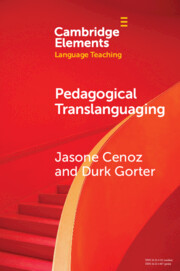Refine search
Actions for selected content:
13 results

Bilingual Academic Language
- Concepts and Case Studies of Multilingual Education
-
- Published online:
- 12 December 2025
- Print publication:
- 16 October 2025
Dispelling some misconceptions of English-medium instruction
-
- Journal:
- English Today , First View
- Published online by Cambridge University Press:
- 03 November 2025, pp. 1-8
-
- Article
-
- You have access
- Open access
- HTML
- Export citation
35 - Trilingual Education in the Basque Country
- from Part VI - Minority Language Education
-
-
- Book:
- The Cambridge Handbook of Multilingual Education
- Published online:
- 25 December 2025
- Print publication:
- 14 August 2025, pp 689-703
-
- Chapter
- Export citation
25 - Helping Learners to Use All Their Languages to Learn Subjects in School
- from Part IV - Dual Language Learning, Immersion Programmes, and Learner Agency
-
-
- Book:
- The Cambridge Handbook of Multilingual Education
- Published online:
- 25 December 2025
- Print publication:
- 14 August 2025, pp 483-510
-
- Chapter
- Export citation
3 - Problematising the Key Issues in Policy and Implementation of Multilingual Programmes
- from Part I - Introduction
-
-
- Book:
- The Cambridge Handbook of Multilingual Education
- Published online:
- 25 December 2025
- Print publication:
- 14 August 2025, pp 36-50
-
- Chapter
- Export citation
38 - Beyond English Medium Orientations
- from Part VI - Minority Language Education
-
-
- Book:
- The Cambridge Handbook of Multilingual Education
- Published online:
- 25 December 2025
- Print publication:
- 14 August 2025, pp 741-756
-
- Chapter
- Export citation
8 - Second Language Learning in Multilingual Education
- from Part I - Introduction
-
-
- Book:
- The Cambridge Handbook of Multilingual Education
- Published online:
- 25 December 2025
- Print publication:
- 14 August 2025, pp 134-150
-
- Chapter
- Export citation
EMI policy and practice divides in China, Japan, Malaysia and Nepal: Policymakers’ neoliberal ideologies and multilingual classroom realities in higher education
-
- Journal:
- English Today , First View
- Published online by Cambridge University Press:
- 13 June 2025, pp. 1-7
-
- Article
-
- You have access
- Open access
- HTML
- Export citation
Bishop Geisler and the 1934 ‘Torello-Ricci Affair’: fighting for moral authority in a Fascist borderland
-
- Journal:
- Modern Italy / Volume 30 / Issue 3 / August 2025
- Published online by Cambridge University Press:
- 11 April 2025, pp. 290-304
- Print publication:
- August 2025
-
- Article
-
- You have access
- Open access
- HTML
- Export citation
4 - Multilingual Education in Formal Schooling: Conceptual Shifts in Theory, Policy and Practice
- from Part One - Becoming and Being a Multilingual Child
-
-
- Book:
- The Cambridge Handbook of Childhood Multilingualism
- Published online:
- 18 August 2022
- Print publication:
- 25 August 2022, pp 82-110
-
- Chapter
- Export citation

Pedagogical Translanguaging
-
- Published online:
- 11 December 2021
- Print publication:
- 27 January 2022
-
- Element
-
- You have access
- Open access
- HTML
- Export citation
17 - Standard Languages and Standardization in the Context of Bilingual Education
- from Part III - Norms, Literacy and Education
-
-
- Book:
- The Cambridge Handbook of Language Standardization
- Published online:
- 01 July 2021
- Print publication:
- 22 July 2021, pp 470-495
-
- Chapter
- Export citation
The MLE Teacher: An Agent of Change or a Cog in the Wheel?
-
- Journal:
- The Australian Journal of Indigenous Education / Volume 43 / Issue 2 / December 2014
- Published online by Cambridge University Press:
- 10 November 2014, pp. 195-207
- Print publication:
- December 2014
-
- Article
- Export citation
